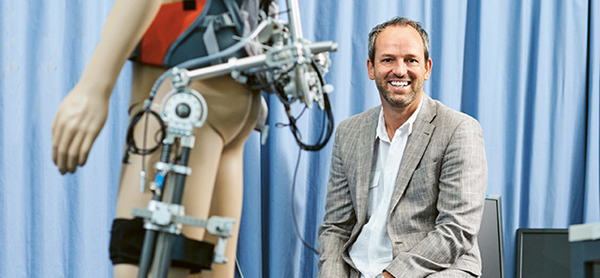“I reply: do whatever you want!”

An open society that does not erect any barriers between people with and people without physical disabilities: that is the goal which inspires mechanical engineer Robert Riener’s research.
After completing my mechanical engineering studies in Munich and Maryland, I did not find a university post at first. That was in the early 1990s. I nearly went into industry, like most of my colleagues, since I had two good job offers. But then things worked out with my research.
Now I’m really glad I pursued an academic career. As a professor I have much greater scope for getting closer to my goal: developing robots that make everyday life easier for people with paraplegia who are confined to wheelchairs. It would be great if one day physical disabilities are not regarded as a deficiency but rather as one human characteristic among many. At the moment my team and I are working on technical clothing that supports paralysed people, enabling them to walk and stand. These exoskeletons are not yet as powerful as we would like, and they run out of battery too quickly. We are setting up a company that will bring the first products to market in about three years.
I always wanted to be a researcher. My father was a car mechanic. Ever since I was little, I have been fascinated by machines and motors. My father helped me build Lego robots, and books of technical inventions engrossed me. I also drew organs and skeletons. Even at primary school, I was thinking about robotics, medicine and research, and I have never lost my enthusiasm for these subjects. Nobody wanted me to go to grammar school, but I managed it.
I don’t like it when one of my undergraduates or doctoral students asks me what they should do next. I reply: Do whatever you want! The important thing is to keep sight of your overall goal, make use of the resources provided by the laboratory and work as part of the team. Each person needs to find their own path. I still don’t know where mine is leading.
Robert Riener, Cybathlon founder
Robert Riener is a special kind of mechanical engineer: he develops unique therapeutic robots and exoskeletons that make everyday life easier for people who are paralysed. Riener, who grew up in Munich, is Full Professor and Director of Sensory-Motor Systems at the Department of Health Sciences and Technology, ETH Zurich. He is also a professor at the Spinal Cord Injury Centre of Balgrist University Hospital, Zurich, and deputy director of the NCCR in Robotics. In 2016, with the support of the SNSF, Riener organised the first Cybathlon, a highly regarded competition for people with motor disabilities.